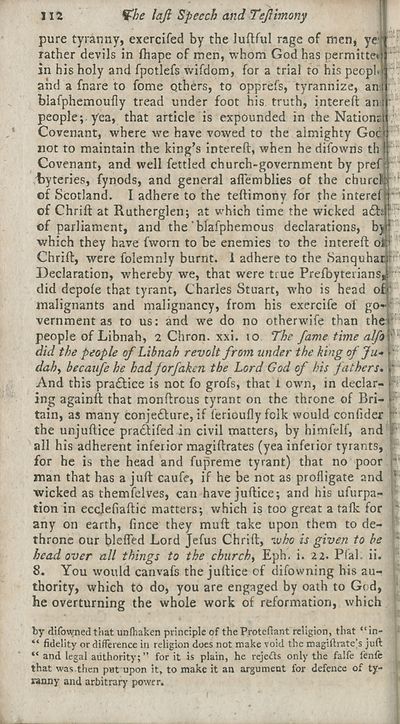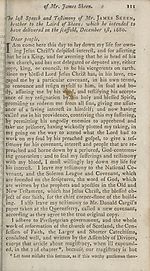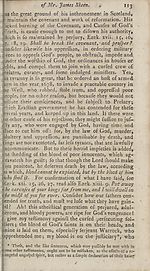Download files
Complete book:
Individual page:
Thumbnail gallery: Grid view | List view

112 fbe laft Speech and Tejlimony
pure tyranny, exercifed by the luftful rage of men, ycj
rather devils in fhape of men, whom God has permittet
in his holy and fpotlefs wifdom, for a trial to his peopl.
and a fnare to fome others, to opprefs, tyrannize, an;
blafphemoufly tread under foot his truth, intereft ani
people; yea, that article is expounded in the Nations
Covenant, where we have vowed to the almighty Go<
not to maintain the king’s intereft, when he difowns th
Covenant, and well fettled church-government by pref
-byteries, fynods, and general aflemblies of the churcl
of Scotland. I adhere to the teftimony for the interefj
of Chrift at Rutherglen; at which time the wicked a£h
of parliament, and the blafphemous declarations, by
which they have fworn to be enemies to the intereft ol
Chrift, were folemnly burnt. 1 adhere to the Sanquhai
Declaration, whereby we, that were true Prefbyterians,1
did depole that tyrant, Charles Stuart, who is head of'
malignants and malignancy, from his exercife of go- ‘
vernment as to us: and we do no otherwife than the:
people of Libnah, 2 Chron. xxi. to The fame time alfo
did the people of Libnah revolt from under the king of Ju*
dahy becaiifehe had forfakcn the Lord God of his fathers.
And this pra&ice is not fo grofs, that l own, in declar¬
ing againft that monftrous tyrant on the throne of Bri¬
tain, as many conjefture, if lerioufly folk would confider
the unjuftice pradfifed in civil matters, by himfelf, and
all his adherent inferior magiftrates (yea inferior tyrants,
for he is the head and fupreme tyrant) that no poor
man that has a juft caufe, if he be not as profligate and
wicked as themfelves, can have juftice; and his ufurpa-
tion in eccjefiaftic matters; which is too great a talk for
any on earth, fince they muft take upon them to de¬
throne our blefled Lord Jefus Chrift, -who is given to be
head over all things to the churchy Eph. i. 2 2. Pfal. ii.
8. You would canvafs the juftice of difowning his au¬
thority, which to do, you are engaged by oath to God,
he overturning the whole work of reformation, which
by difowned that unfhaken principle of the Protcftant religion, that “ in-
“ fidelity or difference in religion does not make void the magiftrate’s juft
“ and legal authority;” for it is plain, he rejeils only the falfe fenfe
that was then pat upon it, to make it an argument for defence of ty¬
ranny and arbitrary power.
pure tyranny, exercifed by the luftful rage of men, ycj
rather devils in fhape of men, whom God has permittet
in his holy and fpotlefs wifdom, for a trial to his peopl.
and a fnare to fome others, to opprefs, tyrannize, an;
blafphemoufly tread under foot his truth, intereft ani
people; yea, that article is expounded in the Nations
Covenant, where we have vowed to the almighty Go<
not to maintain the king’s intereft, when he difowns th
Covenant, and well fettled church-government by pref
-byteries, fynods, and general aflemblies of the churcl
of Scotland. I adhere to the teftimony for the interefj
of Chrift at Rutherglen; at which time the wicked a£h
of parliament, and the blafphemous declarations, by
which they have fworn to be enemies to the intereft ol
Chrift, were folemnly burnt. 1 adhere to the Sanquhai
Declaration, whereby we, that were true Prefbyterians,1
did depole that tyrant, Charles Stuart, who is head of'
malignants and malignancy, from his exercife of go- ‘
vernment as to us: and we do no otherwife than the:
people of Libnah, 2 Chron. xxi. to The fame time alfo
did the people of Libnah revolt from under the king of Ju*
dahy becaiifehe had forfakcn the Lord God of his fathers.
And this pra&ice is not fo grofs, that l own, in declar¬
ing againft that monftrous tyrant on the throne of Bri¬
tain, as many conjefture, if lerioufly folk would confider
the unjuftice pradfifed in civil matters, by himfelf, and
all his adherent inferior magiftrates (yea inferior tyrants,
for he is the head and fupreme tyrant) that no poor
man that has a juft caufe, if he be not as profligate and
wicked as themfelves, can have juftice; and his ufurpa-
tion in eccjefiaftic matters; which is too great a talk for
any on earth, fince they muft take upon them to de¬
throne our blefled Lord Jefus Chrift, -who is given to be
head over all things to the churchy Eph. i. 2 2. Pfal. ii.
8. You would canvafs the juftice of difowning his au¬
thority, which to do, you are engaged by oath to God,
he overturning the whole work of reformation, which
by difowned that unfhaken principle of the Protcftant religion, that “ in-
“ fidelity or difference in religion does not make void the magiftrate’s juft
“ and legal authority;” for it is plain, he rejeils only the falfe fenfe
that was then pat upon it, to make it an argument for defence of ty¬
ranny and arbitrary power.
Set display mode to:
![]() Universal Viewer |
Universal Viewer | ![]() Mirador |
Large image | Transcription
Mirador |
Large image | Transcription
| Antiquarian books of Scotland > Religion & morality > Cloud of witnesses, for the royal prerogatives of Jesus Christ > (116) |
|---|
| Permanent URL | https://digital.nls.uk/134985119 |
|---|
| Description | Thousands of printed books from the Antiquarian Books of Scotland collection which dates from 1641 to the 1980s. The collection consists of 14,800 books which were published in Scotland or have a Scottish connection, e.g. through the author, printer or owner. Subjects covered include sport, education, diseases, adventure, occupations, Jacobites, politics and religion. Among the 29 languages represented are English, Gaelic, Italian, French, Russian and Swedish. |
|---|

